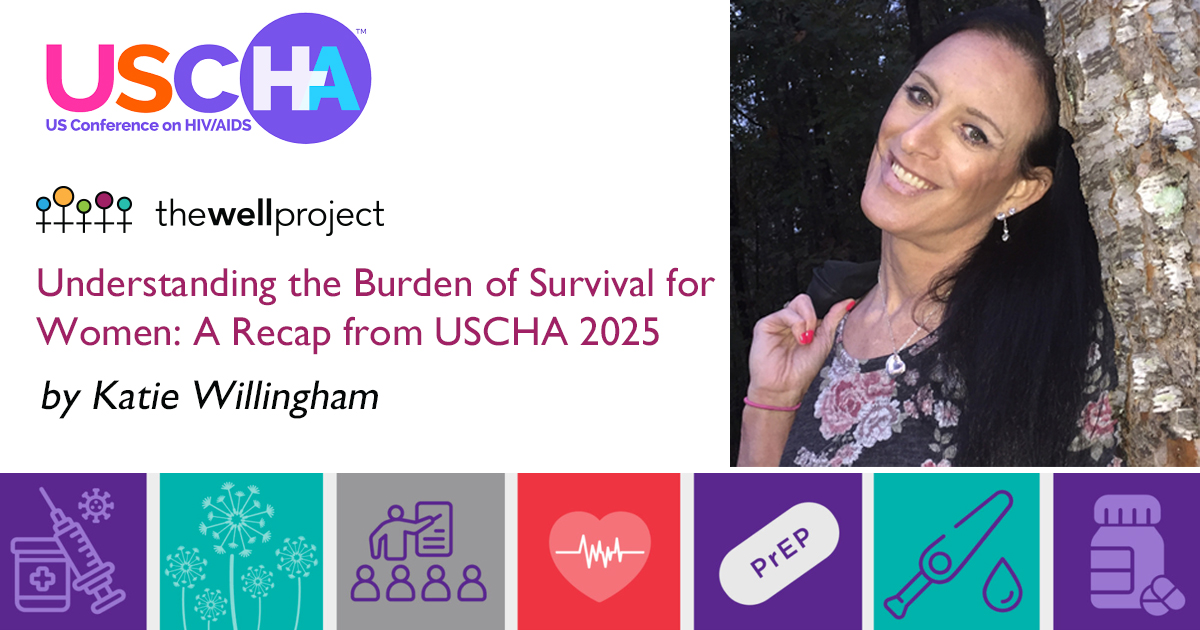
By Katie Willingham
Amid turmoil and uncertainty in Washington, DC, and across the United States, this year's US Conference on HIV/AIDS (USCHA 2025) descended yet again on the nation's capital from September 4 – 7. The theme of the gathering was Aging with HIV, and all sessions incorporated that crucial lens in some way. Members of The Well Project's community were involved in the conference on various levels, reporting on as well as presenting at the nation's largest HIV community meeting.
One really good workshop was "Unlearning Survival: Mental Health and the Burdened Woman." It started off with a few slides, the first slide reading: "Survival has kept us alive, but it has also cost us. Black women, especially women living with HIV, carry burdens of caregiving, stigma, silence and 'strength.'" I found this to be very powerful, but confusing at first: Surviving has COST us?? Presenter Kim Canady's answer is yes, surviving has cost us; or perhaps put differently, merely surviving has cost us. We focus on our health but often that’s not enough. What about living a full life in every sense? Women are burdened with many responsibilities and traumas. Mental health and self-care are often overlooked and put on a back burner and our health suffers because of it.
Kim then talked about "the scripts we inherit" – the expectations often put on women's backs that further burden them. Expectations of being the "strong Black woman," the "superwoman," the "fixer/caretaker," or even the "queer caretaker" taking care of chosen family. These expectations are burdensome but yet women carry them, because we're expected to. But where does that leave us? Often exhausted and sick.
The weight of survival can show up in anxiety and depression, burnout that silences us, stigma, self-erasure, and a loss of connection to pleasure and rest. Unlearning survival is a form of resistance, to rest is a rebellion, setting boundaries is self-protection, and to allow yourself to experience pleasure is power. How powerful is that? Pleasure is power? She then read this quote: "Our ancestors used pleasure as resistance, women in the HIV movement before us demanded survival, now we're carrying that legacy forward by insisting on pleasure and rest as part of our liberation." Isn't that powerful? I thought so. Surprisingly, too often we deprioritize pleasure and rest, but they are also very important for our health as women.
Kim continued by talking about how pleasure has always been a form of resistance, ever since enslaved Black women were denied autonomy over their own bodies, pleasure became an act of quiet rebellion expressed in song and dance, intimacy and storytelling. Rest and joy were used as survival strategies against dehumanization. This was so powerful to learn. Early HIV responses focused only on survival: medicine, crisis and fear management, but that's not enough.
After Kim went through her slides and discussion, she invited a panel to join her in a conversation about it. Those panelists were Masonia Traylor, Ci Ci Covin, Ieshia Scott, and Lynette Trawick. They had an exhilarating conversation that shed some tears and made everyone laugh. You could tell the women were friends and having fun while talking about some pretty serious and heavy stuff. The laughter is great for healing tears and trauma, or masking it, but the latter is not healthy.
Overall, I really enjoyed this workshop. I thought Kim and her panelists did an amazing job, and as heavy as it was at times, it was also very fun. I learned so much. I never before thought of pleasure as a vital survival skill for improving our health, but I completely agree with it now after hearing these amazing women share their experiences. Pleasure is self-care, pleasure is health, pleasure is a revolution, and we should prioritize it in our lives for our best well-being.
More from The Well Project on the 2025 United States Conference on HIV/AIDS (USCHA 2025)
The 2025 U.S. Conference on HIV and AIDS | On The Ground by KatieAdsila on A Girl Like Me
Building Community in a Harsh Political Climate: A Recap from USCHA 2025
Centering Pleasure, and How Providers Can Help: A Recap of USCHA 2025
Crafting Tools to Communicate HIV Care Gaps: A Recap from USCHA 2025




